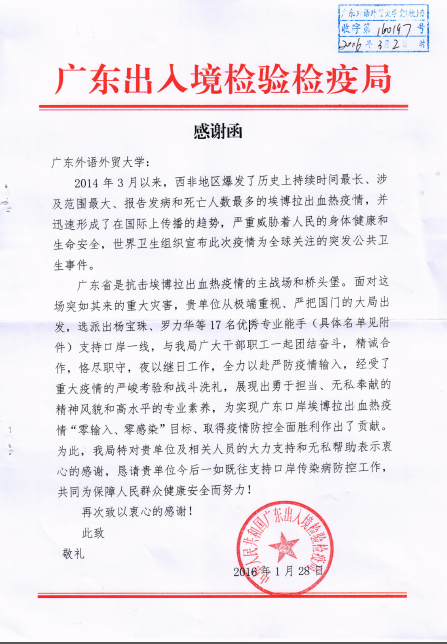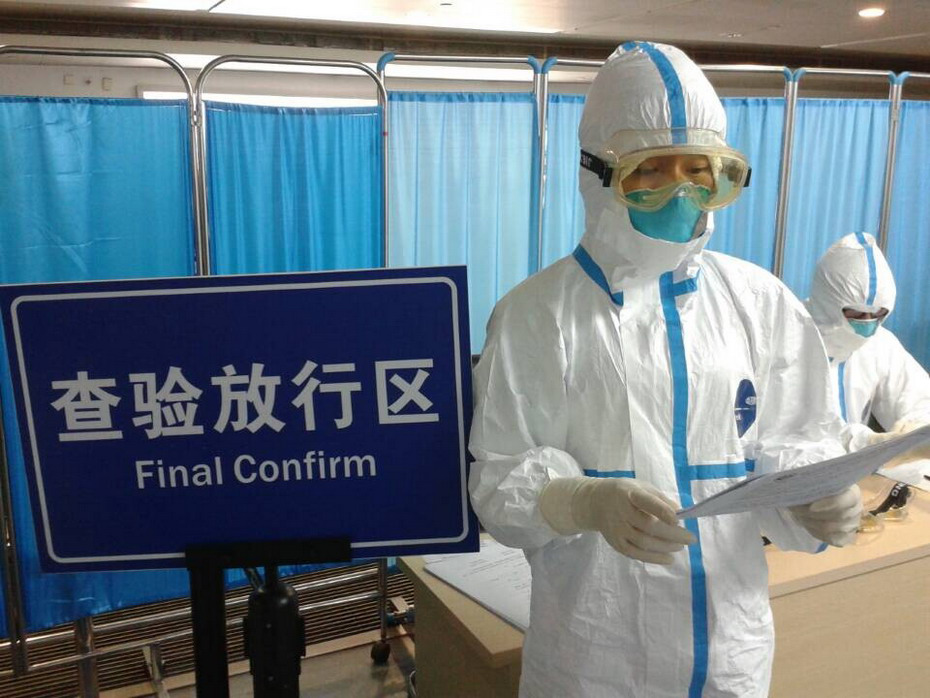In March, GDUFS received a thank-you note from Guangdong Entry-Exit Inspection and Quarantine Bureau, for the strong support and selfless help of volunteers who survived the ordeal of severe epidemic and harsh combat, in which they had showed their courage, selfless dedication and a high level of professionalism. Volunteers had made their great contribution to realizing the objective of zero input, zero infection of Ebola hemorrhagic fever at Guangdong port of entry, and overall success of epidemic prevention and control.

At the beginning of 2014, the Ebola virus, of which the fatality rate was up to 90%, spread from West Africa to the whole world. In November, when the Canton fair was about to begin, a large number of foreign merchants flew to Guangzhou. In face of the threat from Ebola, Guangzhou Baiyun Airport asked GDUFS for help. They wanted to recruit volunteers to work for the French translation service for the airport exit and entry, and to assist the airport staff collect registration information. On November 2nd, GDUFS received an emergency notice from the Provincial Education Department about “selecting French translators from colleges and universities for the verification work of the control and prevention of Ebola hemorrhagic fever epidemic”, and demanded volunteers to work on November 3rd.
In just a few hours after receiving the notice, a group comprised of 12 volunteers from the French department was ready for work: people worked in pairs and took turns to work: one worked for four days in a row; three volunteers worked a day sequentially without a break. From then on, these 12 "fighters" had checked the information of more than 10,000 passengers from more than 1,200 flights in 301 days. Due to their responsibility and earnestness, they had become legends.

“Yes, indeed, I hesitated at first, because we were facing such a high mortality rate." Volunteer Rong Yizhi said when he recalled the experience. Apart from the death toll in the epidemic area every day, a look at the equipment provided by the epidemic prevention station in the airport was quite scary: disposable protective clothing, medical protective mask, eye mask, protective gloves, and waterproof boots. What’s more, they had to comply with strict orders and requirements of wearing and taking off clothes.
They had to be very careful with the equipment, including masks, breathing apparatus, goggles and protective clothing. They had to wear them layer by layer according to the procedure, and then went to work. Protective clothing was especially made, which was sealed to prevent infection, but people were also wrapped tightly, leaving no inch of their skin exposed to the air, which made them feel suffocated. It was not a comfortable experience. Though the November of Guangzhou wasn’t very hot, they sweated like dogs when taking off the protective clothing.
Besides, they also met with resistance from their parents. Xie Huijiang’s father said in an interview, "Her mother was very worried; especially at the beginning, she strongly refused to let her take the risk".
"We had to do the work even knowing its danger, or more and more people would suffer from the danger if the risk spread". The fact that Xie Huijiang worked day after day in the forefront and was always full of passion had convinced her parents. Thus, the opposition from her family members gradually turned into support.
They took on a variety of roles, including: translation for passengers and the station staff, and assisting the staff to hand out mobile phones and health packages to the passengers. Among the incoming passengers, people from Congo, Liberia and other African countries needed to be specifically monitored. The entire team was responsible for the registration of their personal information: name, nationality, passport number and issuing time, boarding pass, flight information, and so on. One of the most important jobs was to record the health and report immediately if they found any abnormal situations, then send the passenger to the isolation room, and urge passengers to leave their residential address for long-term monitoring. Because this task was very important, the work was demanding and tiresome.
These 12 volunteers were divided into two teams: one worked from 9 AM to 4 PM; the other worked from 4 PM to 9 AM of the next day. And they often couldn’t sleep the whole night. In order to let the girls rest sufficiently, four boys asked to work at night. The girls were very grateful. Though it was relatively easy in the morning, there was no respite when a lot of passengers arrived.
When it became a habit, their previous fears had been watered down. And everybody was much calmer. "I want to say that we 12 people were really brave. And the most important thing is that we were together; we didn’t feel afraid when we were together."

During the service, there were volunteers working at the airport’s epidemic prevention station on the Eve of Spring Festival. Some volunteers didn’t go home for the first two days. "The biggest feeling was that we must be dedicated and punctual. We must not treat it as child's play. Our mobile phones were kept on for 24 hours. We had to show our attitude and sense of responsibility. It was a process of personal growth," the volunteers said.
When assisting staff dispatch health packages, some tourists thought it labeled them the "Ebola patients", and refused to accept it. Volunteers did their best to communicate with the passengers. In the end, most of the passengers understood, and said in French: "the Chinese are friendly!" At this moment, the volunteers felt fulfilled, and they had more enthusiasm to learn French.
The volunteers said they wanted to thank their teachers for their encouragement and help, especially the old French professor Gossot, who volunteered to give them extra lessons for volunteer work. The volunteers expressed their full gratitude and love to him. In order to live up to teacher’s care, they would review lessons even in the short break. Although the volunteers often did translation work, they said they often felt distressed because of communication problems. Sometimes, some accent problems would make them frustrated. But, very soon, they gained the motivation to study. They would use every opportunity to practise their French.
The volunteers worked at the epidemic prevention station for nearly a year. When talking about it, they always believed that this experience was extraordinary, which helped them grow and develop and taught them the meaning of responsibility.
On December 24th 2015, they wore red Spanish suits and stood on the stage in Yunshan Hall. They were awarded the "principal award" for their excellent service and their sense of social responsibility.
Chinese Report: 抗埃博拉志愿者团队:用大爱谱写传奇

